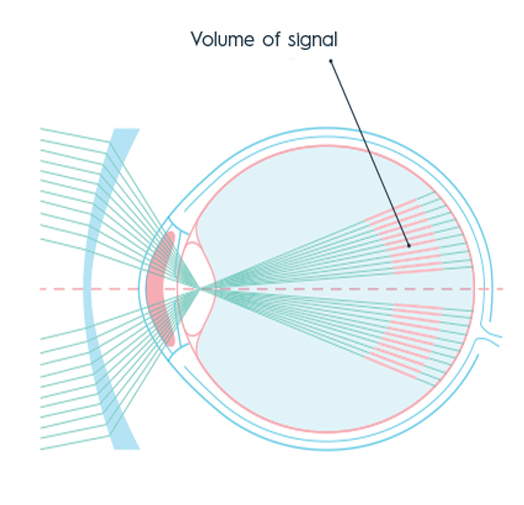Myopia On The Rise
1 in 4 Parents
have a child with myopia
Myopia has doubled
in the U.S. children since the 1990s.
50% of the world's
population will be myopic by 2050
What is Myopia Management?
Myopia Control Decatur GA
Myopia, commonly known as nearsightedness or shortsightedness, means you can see up close better than you can far away. It is the most common refractive error among children and young adults. Why does it matter? High amounts of nearsightedness are associated with glaucoma, retinal breaks or detachment and maculopathy.
Myopia Management, also known as myopia control, is a treatment method to slow the progression of myopia in children and adults. Myopia management is based on scientific evidence that can
slow myopia progression by 40–60%. It may also reduce the risk of
myopia-related eye problems later in life.


Treating & Managing Myopia
Traditional glasses and contact lenses can improve blurred distance but do not address the worsening of vision. Myopia control provides solutions for slowing eye growth thus preventing myopia progression. There are multiple methods for controlling myopia progression, it may include one or a combination of the following:
TREATMENT OPTIONS
Ortho-K Overnight Lenses
Atropine Eye Drops
MiSight Contact Lenses
Spectacle Lenses (MiYOSMART) awaiting FDA approval
Ortho-K
After an initial consultation, Dr. Minh Ta will prescribe an appropriate treatment for your unique care and lifestyle needs. At Specs Appeal we base our recommendations on the latest research, years of experience, and your individual comfort.
More details on treatment options: https://hootmyopiacare.com/doctor/161

Why Is Myopia Control Important?
Myopia control is about quality of life. Slowing down myopia progression by 50% can reduce the chance of developing high myopia by 90%.
The higher the myopic prescription, the higher the risk of major eye diseases or vision impairments later in life including. retinal detachment, glaucoma, cataracts, and neovascularization.
HOW WE CAN HELPTreatment Options
Orthokeratology
Although there is no known cure for myopia some treatments and management strategies can help restore distance vision. Also known as “corneal reshaping lenses”, ortho-k contact lenses are specially
designed gas permeable contacts that are worn only at night during sleep. Ortho-k has been shown to slow myopic progression in children by 36% – 56%.
These lenses work to temporarily reverse the effects of Myopia by
reshaping the eyeball while you sleep, allowing the wearer to
experience clear vision the following day. This pain-free process allows clear, corrected vision without the use of contacts or glasses
throughout the day!
If you have questions or concerns about ortho-k, schedule an
appointment with us today. We will be able to help you determine your candidacy, costs, benefits, and risks of the process.


Atropine Eye Drops
Atropine eye drops, while not a cure for myopia, can be used to slow its progression. They work by temporarily blocking the eye's focusing muscles, which may help prevent the eyeball from elongating, a key driver of myopia.
Typically, a single drop is administered daily, often at bedtime, in each eye. While traditionally higher doses were used, recent research suggests low-dose formulations (around 0.05%) may be just as effective with fewer side effects like blurry near vision and light sensitivity.
Atropine may not be suitable for everyone. For safety and effective use, atropine must be closely monitored by an eye doctor. Find out if atropine is a good solution for you by scheduling an appointment with Specs Appeal today.

MiSight® Contact Lenses
MiSight® contact lenses are a unique tool in the fight against myopia progression in children, working through a clever design to both correct vision and potentially slow eye growth. These daily disposable lenses, worn during the day and discarded at night, utilize a special concentric ring pattern:
Central Correction Zone: The core of the lens focuses light precisely onto the retina, sharpening distance vision just like traditional contact lenses.
Myopic Control Zones: Surrounding the central zone are alternating rings with slightly different powers. These rings intentionally focus light slightly in front of the retina, creating a mild "blurry" signal. This is
believed to send feedback to the eye, discouraging its elongation
and potentially slowing myopia progression.
By combining clear vision with this myopic control mechanism,
MiSight® lenses offer a promising approach for managing myopia in children.
Stellest Lenses
Essilor Stellest Lenses slowed myopia progression by 71% on average over 2 years!
A smart combination with dual benefits CORRECT Single Vision Zone to correct refractive error. CONTROL Powered by H.A.L.T.† technology, the light rays pass through 1021 highly aspherical lenslets. This creates a volume of myopic defocus in front of the retina and follows its shape, which acts as a signal to slow down eye elongation.


Fitting
The large surface covered by lenslets allows a wide frame choice And offers the H.A.L.T† technology benefits in all gaze directions from edge to edge. Horizontally Monocular pupillary distance OD and OS. Vertically Monocular heights OD and OS: mark the monocular pupil center in horizontal gaze direc
Additional recommendations to give to parents and children
1) Increase children’s outdoor time.
2) Follow the 20/20/20 rule (every 20 minutes, focus on an object 20 feet away for at least 20 seconds) to give children’s eyes a constant break







